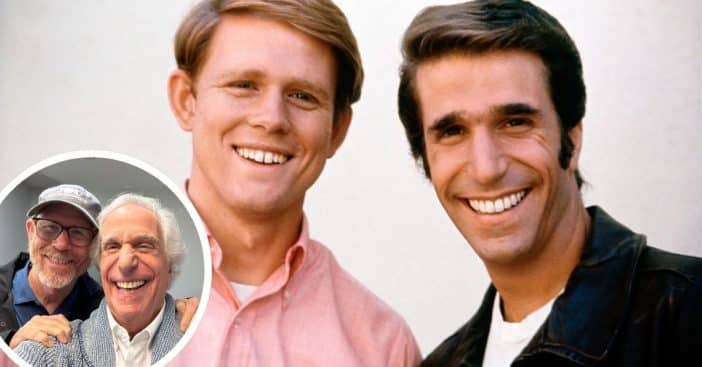
The epitome of cool and the All-American teen. Henry Winkler and Ron Howard were a fun, engaging duo to watch across over half a dozen seasons of Happy Days, which aired its last episode in the summer of 1984. Now, very nearly 40 years after the finale, both stars crossed paths again in Australia for a heartfelt reunion that made for a very happy day for both of them.
Winkler is still celebrating the release of his new memoir, Being Henry: The Fonz…and Beyond, which hit shelves last October. “Filled with profound heart, charm, and self-deprecating humor, Being Henry is a memoir about so much more than a life in Hollywood and the curse of stardom,” reads its synopsis online.
Ron Howard and Henry Winkler were nothing but smiles during their reunion down under
Just started post production in Sydney on my recently wrapped latest movie @edenthemovie starring an amazing cast. A great creative experience but that’s for another post. When I touched base with Henry, I discovered he was making an appearance here in support of his excellent… https://t.co/fNlWr5qGRZ
— Ron Howard (@RealRonHoward) February 7, 2024
Howard and Winkler both found themselves in Sydney recently, Howard to finish post-production on his new film, Eden, which is due out later this year. But in the midst of that triumphant final leap, Howard took to Twitter to share another exciting update: this one, a blast from the past. “When I touched base with Henry, I discovered he was making an appearance here in support of his excellent best-selling memoir,” Howard shared.
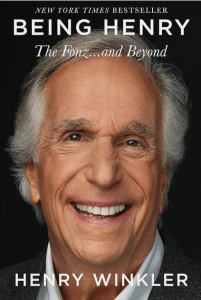
RELATED: Henry Winkler Says Friendship With Ron Howard Was Tested As Fonzie’s Popularity Soared
Howard went on to reveal, “We connected backstage and I watched him give a great speech to a huge crowd. What a blast!” The accompanying photo puts the final joyful touch on this reunion between Howard and Winkler, as the two TV friends stand arm-in-arm smiling like no time has passed at all since Richie and Fonzie were getting into mischief together.
Winkler was equally excited that Howard “came to my book event in Sydney Australia.” So far, his schedule overseas is set to continue through to February 19. During the autumn run of his tour, Winkler reflected on his childhood growing up in New York, his approach to acting, and life four decades after Happy Days — and it’s been an eventful one after the hit series ended, with credits spanning both television and film in just about every year since. His most recent credits in film are in Black Adam, while television has seen him in Quarterback and even doing voice work for Family Guy and The Legend of Vox Machina.
What is Ron Howard doing now?
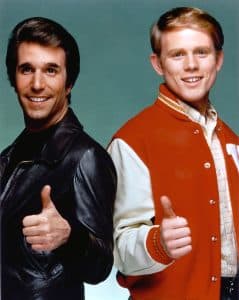
It’s no surprise a reunion, even four decades later, between Henry Winkler and Ron Howard would play out so well today; the two synergized well together on-screen and that manifested in a friendship behind-the-scenes as well. In fact, when Happy Days producers wanted to rename the show to focus more on Fonzie, who soon gained more screentime than Richie, Winkler wanted no part of it and counted the move as a betrayal to the cast.
There was actually even more to the story than that in the sense that although Winkler turned the idea down flat, the ultimate arbiter of whether or not the show became Fonzie’s Happy Days turned out to be Howard himself. As he reflected to the Archive of American Television, in developing the show, producer Garry Marshall was inspired by the films American Graffiti and Summer of ’42, imagining a show that would focus primarily on the Cunningham family and particularly his character of Richie.
“It quickly evolved into a show more about the friends and the family,” he says. “But then the Fonz character exploded over the first couple of seasons and just grew in a remarkable way. Eventually the focus of the show became really more about Fonzie and they had to almost manufacture a relationship between Fonzie and the family, which is why he started living in the garage apartment with the Cunninghams, because they didn’t want to lose the family.”
The attention Winkler got, he emphasizes, did not bother him as he felt his co-star deserved it. In fact, when they went on a promotional tour, the two of them recognized how big things were getting. “It was a little bit like we were a boy band, and Henry was the lead singer or something; it was kind an N’Sync or Beatlemania kind of thing. It was wild.”
However, between the second and third season, he was approached by Marshall and a couple of the producers and told that the network program director, Fred Silverman, wanted them to change the name of the show to the aforementioned Fonzie’s Happy Days. If he agreed, he would get a substantial raise and the opportunity to direct episodes as he’d expressed his desire to move into that field.
The clip above is the opening credits of Happy Days Season 4, where Henry Winkler’s position in order of appearance jumped up to right behind Ron Howard’s.
The directing promise was a non-starter for him as Jerry Paris was the regular director and Howard refused to have him removed for his potential episodes. He quickly gave his response: “I really signed on to be at the center of a show called Happy Days. I respect what’s happened here, but rather than be in Fonzie’s Happy Days, I’d rather go back to film school.”
“Gary Marshall,” he continues, “said, ‘Well, we’re not going to do this if you don’t want to do it.’ And I said, ‘I just don’t think I can feel good about it. I love Henry, but I just wouldn’t want to do that.’ And they understood, and I understood that the show was going to shift. That they were going to move Henry more to the center of the show and I could accept that. So they didn’t change it, but the show did shift and the fantastic thing was it was a wonderful ensemble. We always treated it as an ensemble. Henry Winkler and I were kind of like brothers, and he was sort of like a big brother to me in a lot of ways. We worked well together and we became a big hit.”
His biggest frustration was with the executives at ABC and Paramount (the studio behind the show), the results of which taught him a lesson: “Their interest in me really waned, so it wasn’t the environment of making the show that was fantastic, but there was this kind of disrespectful disregard that really kind of rankled.”
For his part, Winkler has nothing but praise for Howard, which he’s held since the early days. “We could do three-page scenes in 20 minutes,” he said in a separate Archive of American Television interview. “He went where I went; it was uncanny and that’s not hyperbole and I’m not romanticizing it. He’s the younger brother I never had. But there was a moment, I’m going back now a little bit to the beginning, when I looked at the script and I got really intense. I hit the script and thought, ‘I can’t do this; I don’t know how to do this.’ And Ron put his arm around me — and remember, he’s 10 years younger than me — and walked me to the back of the sound stage and said, ‘The writers are trying as hard as they can. I don’t think it’s a great idea to hit the script.’ I said, ‘Ron, I’ll never hit the script again.’ He was my teacher. This young 18-year-old boy, with ears where he could fly and a lot of red hair at that time, was my teacher and my guide.”
Which is why he was stunned when, as Happy Days was getting ready to go into its eighth season, he received a certain phone call “in the blue phone booth that was next to the donuts,” says Winkler. “Ron said, ‘Henry, I’ve got to tell you that I’m not coming back.’ I said, ‘What do you mean you’re not coming back?’ ‘I’m going to be a director; I’ve decided not to sign back on and I’m not doing the show anymore.’ I thought my life was over. I never had an acting partner like this in my life. There was an unspoken connection between Ron and me.”
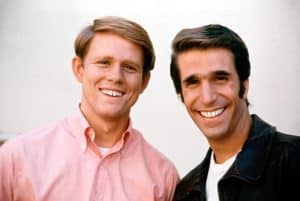
For Ron Howard, leaving Happy Days was the right decision
Similar to Winkler, Howard has proven himself a powerhouse of thoughtful talent in front of and behind the camera. That’s because Howard has gotten his inspiration from a bit of everywhere, regardless of genre or industry.
“I had read Frank Capra’s autobiography, The Name Above the Title, which galvanized my passion to overcome all obstacles and become a filmmaker,” shared Howard. It was a definitive move at a formative time. “I was probably 17 when I read this book, and I’d been making short films and telling anyone who would listen that I wanted to be a director.”
“But,” he went on, “finishing that book, I not only began to be a student of Capra, but I really threw down the gauntlet and said, ‘I don’t hope to be a director. By God, I am going to be a filmmaker.'”
Going on to direct Frank Capra’s American Dream was a poignant career move, but ultimately far from the first in his directorial resume. It started in ’77 with Grand Theft Auto, which he also co-wrote with his father Rance, and continued with Night Shift, Cocoon, Willow, with several credits filling the subsequent decades. He’s the man behind the Jim Carrey-led How the Grinch Stole Christmas, The Da Vinci Code starring Tom Hanks, along with the follow-up Angels and Demons and Inferno, and in addition to Eden, he’s also worked on The Shrinking of Treehorn for Netflix.
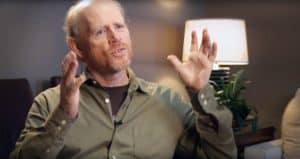
For every project Howard has touched as a director, almost the same number has won or been nominated for some award or another. So far, one of his most-nominated is Apollo 13, and his most decorated is A Beautiful Mind.
Looking back, there were some growing pains to becoming a director, both for Howard – including in the literal sense, having to figure out going underground to film the rescue drama Thirteen Lives – but also for those he was parting ways with on Happy Days. Fans bid farewell to Howard’s Richie after season seven for him to pursue directing in earnest, and Winkler in particular felt the sting of separation with painful clarity.
“I was completely thunderstruck,” Winkler writes in his memoir, “I was devastated, I was scared — you name it, I was feeling it. It was shocking.” But it is a testament to the strength of the friendship they built in those seven years that their friendship endured the whole time. “Fifty years of history,” Winkler remembers. “All in the same place, at the same time. It was palpable.”
